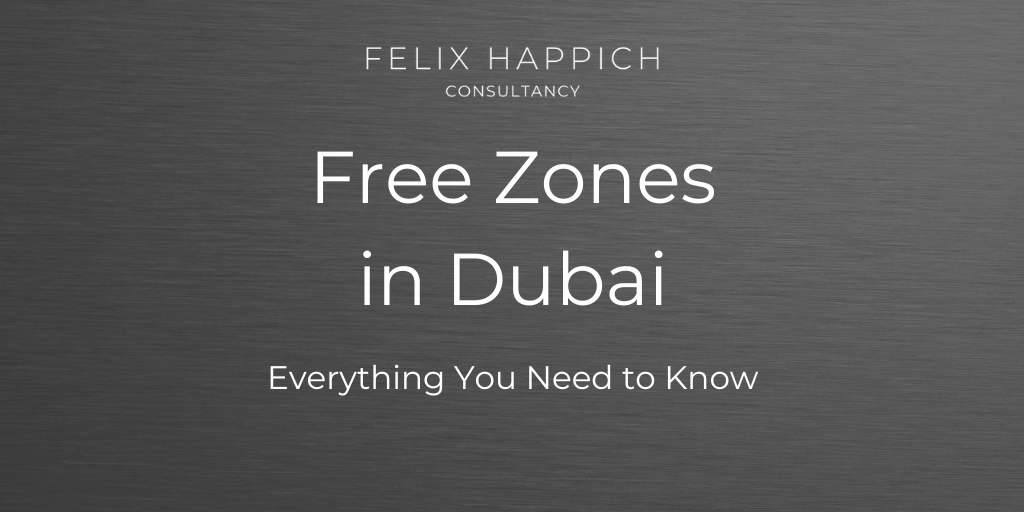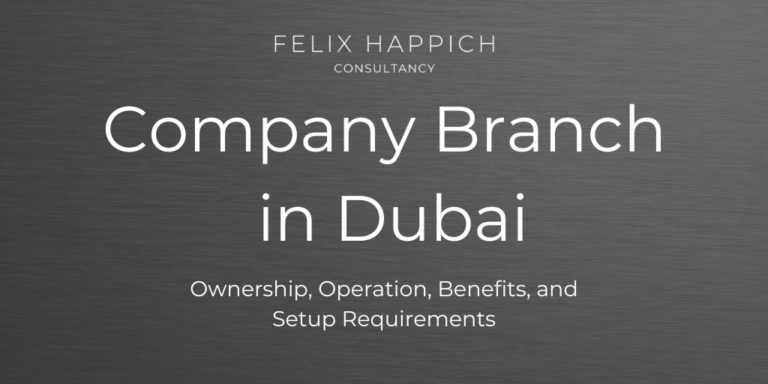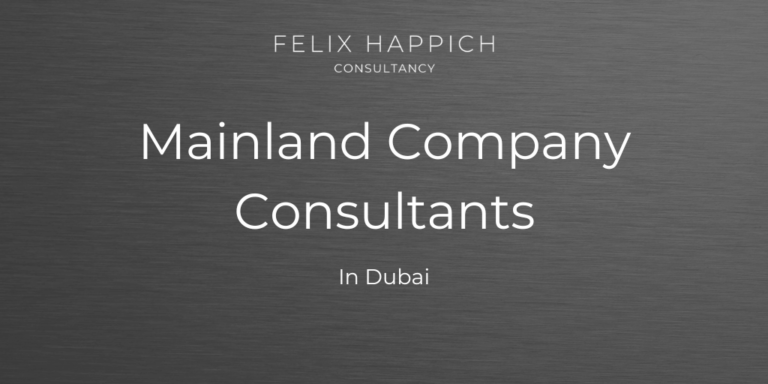Dubai Free Zones (FZ) are income-tax-free areas offering 100% foreign ownership, zero corporate and personal taxes (on qualified income), and modern infrastructure. The purpose of these special economic zones is to attract global businesses and to give an extra boost to the economic sector. Dubai’s free zones are projected to contribute 250 billion dirhams to the emirate’s GDP by 2030, according to Sheikh Ahmed bin Saeed Al Maktoum (Chairman of Dubai FZC).
The Dubai government has established 27 free zones, including prominent examples like DAFZA and JAFZA, to provide opportunities for expatriates and investors. Notably, Dubai Internet City (DIC) was home to over 4,000 companies in 2024, reflecting the zone’s strong business ecosystem, according to reports from the Dubai Integrated Economic Zones Authority. In addition to the free zones, Dubai also has other business jurisdictions, such as mainland and offshore, where certain taxes apply.
Free Economic Zones (FEZ) in Dubai are divided into different categories including Technology, Financial, and Business Services Free Zones based on business activities they support. However, these divisions aren’t rigid, as many Free Zones, like DAFZA and JAFZA, support a wide range of business activities including trade, finance, and professional services. Some zones, however, still focus on specific sectors; for instance, Dubai Commerce City primarily supports the e-commerce industry.
Every Free Zone in Dubai offers uniform advantages, such as tax exemptions, 100% foreign ownership, and easy business setup procedures. However, some Free Zones provide extra perks to get a competitive edge. For example, JAFZA and DAFZA are known for their fast registration processes, which often take just 1-2 weeks. Overall, the business setup process is much easier in free zone jurisdiction.
What is a Free Zone in Dubai?
Dubai Free Zone (Dubai Free Trade Zone) is a specialized economic zone (SEZ) that allows 100% foreign ownership, provides tax exemptions, ensures fast and easy registration, and permits unrestricted capital repatriation. These zones are designed to attract foreign investment, accelerate economic growth, and position Dubai as a global business hub, as stated by the Dubai Integrated Economic Zones Authority.
When was the first free zone established in Dubai?
The first free zone in Dubai was established in 1985 and is known as the Jebel Ali Free Zone (JAFZA), founded by Sheikh Mohammed bin Rashid Al Maktoum, the Vice President and Prime Minister of the UAE and Ruler of Dubai.
The primary purpose of JAFZA is to create a business-friendly environment that attracts foreign investors and facilitates international trade. The establishment of JAFZA has significantly contributed to Dubai’s economic diversification, positioning it as a global trading hub, as reported by Dubai Economy.
What are the Types of Free Zones in Dubai?
Dubai Free Zones are divided into two broad types, General Free Zones, and Specialized Free Zones, which are organized based on their purpose and industry focus. Though there is no strict rule for this division, the purpose is to benefit from industry-specific facilities while also providing flexibility for multi-sector businesses.
Below are the two broad types of Free zones in Dubai.
- General Free Zones
- Specialized Free Zones
General Free Zones: General Free Zones in Dubai are designated areas that are not limited to a specific sector but are open to diverse business activities. These include JAFZA supporting logistics, manufacturing, and trading, and DAFZA supports aviation, logistics, and electronics business.
Specialized Free Zones: Specialized Free Zones in Dubai refer to the economic sector constrained to a specific industry. Such zones offer infrastructure, incentives, and regulatory support to meet targeted business needs. For example, Dubai Internet City (DIC) focuses on technology, Dubai Healthcare City (DHCC) focuses on healthcare, and Dubai Media City (DMC) focuses on media.
Different Free Zones in Dubai
About 27 free zones are established in Dubai to support the business community as per the Dubai Free Zone Council. Each free zone offers unique opportunities based on the strategic location and the industry type. Below are the 15 most popular free zones in Dubai.
- Dubai Silicon Oasis
- Dubai Internet City
- Dubai Industrial City
- Dubai Airport Free Zone
- Dubai Production City
- Dubai Studio City
- Dubai Healthcare City
- Dubai Maritime City
- Dubai Media City
- Jebel Ali
- Dubai Multi Commodities Centre
- International Free Zone
- Dubai International Financial Centre
- Dubai South
- Dubai Science Park
Regardless of the different locations and industry types, the purpose of Freezone is to expand, support, and flourish business within Dubai. For a comprehensive overview of the popular free trade zones with a detailed discussion of their purpose and opportunities do check the Dubai free zone list.
What are the benefits of Free Zones in Dubai?
The main benefits of the Free Zone in Dubai are 100% foreign ownership, Tax-free operations, and full Repatriation of Capital and Profits. Below, I have discussed 4 advantages in more detail with a logic of how it helps you.
- 100% Foreign Ownership: Foreigners can have complete ownership of their businesses without collaboration with a local sponsor. This helps in full control and independent decision-making.
- Tax Advantages: Free Zones offer Corporate Tax and Import/Export Duty-free business activities for entities with qualifying income, which helps reduce operational costs.
- Simplified Business Setup: Free Zones have simple business setup procedures with minimal paperwork and capital requirements. For example, DAFZA requires a minimum capital of AED 1. This helps business owners launch without stress and risk of rejection.
- Repatriation of business Profit: Free Zones allow full business profit repatriation without restrictions. This helps to reassure investors that their investments are secure and can be repatriated according to their expectations.
Is Dubai Free Zone tax-free?
Yes, Dubai’s Free Zones are generally considered tax-free zones for businesses. They offer 0% corporate tax on qualified income as well as exemption from import and export duties. According to the Dubai Free Zones Council, investors in these zones may benefit from tax exemptions for up to 50 years.
Qualified income is defined under Federal Decree-Law No. 47 of 2022 on the Taxation of Corporations and Businesses. It includes revenues from specific activities carried out within the Freezone, such as international trade, warehousing, manufacturing, logistics, and services provided to other Freezone entities.
To benefit from the 0% tax rate, the company must be recognized as a Qualified Free Zone Person – meaning it must be economically active in the Freezone, meet substance requirements, and generate little to no revenue from the Mainland. If any of these conditions are not met, the business becomes subject to the standard corporate tax rate of 9%.
What are the Legal Aspects of a Free Zone in Dubai?
Dubai Free Zones have an Independent legal framework, which means every entity has its own legal framework, rules, and regulations. However, the 3 common legal aspects are
- Foreign Ownership
- Tax Regulations
- Business Operations
Foreign Ownership: 100% foreign ownership within free zones is the legal aspect of UAE Federal Law, which governs foreign investment in the UAE.
Tax Regulations: The UAE’s corporate tax law exempts Free Zone companies from corporate taxes (on qualified income), which nullifies the 9% tax that applies to other jurisdictions.
Business Operations: Companies in the UAE Free Zones are subject to specific regulations under the Federal Decree by Law Concerning the Protection of Personal Data.
How to Set Up a Business in a Free Zone in Dubai?
Setting up a business in a Dubai Free Zone involves a series of straightforward steps. First, you have to choose a specific business model, which includes FZE, FZCO, and FZ LLC.
Next, you must submit the key requirements. These typically include an application form, a business plan, legal documents, and – depending on the regulations of the specific Free Zone – a local service agent or representative.
After the legal requirements are fulfilled, the payment will be processed based on the chosen Free Zone and the specific business activities. Typically, the initial investment ranges from AED 10,000 to AED 50,000, which covers registration fees, licensing, and office space. However, this amount may vary depending on the respective Free Zone.
For the Step by Step process, you can visit our Business Setup Guide in Dubai Free Zone. There we process everything a person needs to know before the investment.
Setting up a business in a Dubai Free Zone offers investors complete ownership, profit repatriation, and access to a cream business community. Furthermore, Free Zones often host networking events and provide business support services to facilitate growth. Some famous business networking events hosted include GITEX, Dubai International Film Festival (DIFF), and Arab Health.
How long does it take to set up a business in a Dubai Free Zone?
Business Setup in a Dubai Free Zone takes 7 days to 28 days (1-4 weeks). However this time frame is highly subjective based on the specific Free Zone, the type of business being established, and the efficiency of the service provider involved.
Do I need local sponsorship for a Free Zone business in Dubai?
No, you do not need local sponsorship for a Free Zone business in Dubai. It allows 100% foreign ownership, as per UAE regulations, which state that businesses established in Free Zones do not require a local partner or sponsor.
What are the Key Factors for Choosing a Free Zone Business?
The key factors for choosing a free zone business include Strategic Location, Business Setup procedure, Business Environment, and Infrastructure. Remember, we are not considering ownership and tax structures, as they are generally similar across all Free Zones.
The Below table summarizes the key factors to consider when choosing a Free Zone for your business in Dubai. To be clear about why it is important to pay attention to them, I added descriptions for an explanation
| Key Factor | Description |
| Business Activity | Choosing a Free Zone that matches your business activity is crucial, as some are general while others focus on specific industries. Thus right selection ensures access to specific resources and networks related to your industry. |
| Location | The location of the Free Zone significantly affects accessibility, infrastructure, and proximity to target markets. For instance, proximity to airports and seaports enhances operational efficiency and reduces shipping times and costs |
| Business Setup process | The business setup process affects both time and cost. An efficient setup process reduces both the time required and the associated costs for the business. |
| Business Environment | The business environment consists of a regulatory framework, legal aspects, and support services. The better the environment, the higher the rate of business success. |
| Reputation | The reputation of a trade zone influences a business’s credibility and enhances brand trust. A reputable zone improves your brand image and creates greater networking opportunities. |
Free zone Business license
In Dubai Free Zones, licenses are required for every legal entity. Even traders cannot operate without a trade license, as mandated by the Dubai Department of Economic Development for businesses in wholesale and retail sectors. Similarly, a Service License is necessary for professional services such as consulting, IT, and healthcare, as stated by the UAE Government Portal, to ensure a standard of quality.
Different types of Licenses are available for various business activities, each with unique features and benefits. The following are the main types of free zone business licenses.
- Trading License
- Service License
- Industrial License
- Logistics License
- E-commerce License
- Freelance License
- Tourism License
Freezone Visa in Dubai
In Dubai, free zone visas are essential for foreign investors and employees wishing to work in this jurisdiction. Here are 3 common types of visas:
- Investor Visa:
- Employment visa
- Specialist resident visa
These visas have specific validity time frames with the Investor Visa valid for 2-3 years, the Employment Visa for 1-3 years, and the Specialist Resident Visa for 2-10 years. This time varies based on the legal aspect of Dubai and the specific zone regulations. Similarly, the cost of each visa type is different but the general range is from AED 7,500 to AED 20,000.
Opportunities in Free Zone Dubai
Dubai’s Free Zones offer a wide range of opportunities for businesses. These opportunities are increasing day by day. The UAE government pays special attention to the free zone jurisdiction as mentioned in Dubai Economic Agenda D33. Below are the 7 most common opportunities which everyone can avail easily.
- Chance to operate with 100% foreign ownership
- Opportunity to benefit from a tax-free environment, including zero corporate tax (on qualified income) and import/export duties.
- The streamlined setup process simplifies your business setup with minimal documentation and fast processing times.
- Chance to reach industry-specific zones (e.g., tech, media, finance)
- Access to world-class facilities specific to various industries
- Strategic location for access to the global market, including Middle Eastern, African, and Asian markets
- Freedom to move profits and capital internationally
- Easier employee visa sponsorship and streamlined HR procedures.
Opportunities for employees in the Free Zone
Employees in Free Zones have unique opportunities that cater to their professional growth and development.
- The mixed work environment attracts international talent, allowing employees to collaborate with professionals from various backgrounds.
- The Dubai Free Zones Council emphasizes this multicultural setting of creativity and innovation among workers.
- It often promotes development programs, providing training and skill enhancement opportunities to improve employee competencies.
Opportunities for marketers in the Free Zone
Free Zones allow marketers to effectively target niche markets, adjusting campaigns to specific sectors. This segmentation leads to more impactful marketing strategies and better ROI, as endorsed by research from the Dubai Chamber of Commerce.
According to industry experts, marketers can experiment with digital marketing techniques and data analytics in these zones to refine their approaches. Additionally, marketers can engage with international clients, enhancing their global marketing experience. Networking events and collaborative platforms within Free Zones facilitate connections that can lead to strategic partnerships.
Which types of companies can one establish in Dubai Free Zones?
The types of companies you can establish in Dubai Free Zones include Free Zone Establishments (FZE), Free Zone Companies (FZC), and branch offices of existing companies. Explore the free zone companies to see the diverse businesses operating in these zones.
What makes Freezone a better choice for small businesses?
Simplified procedures, tax benefits, and strategic locations make Free zones a better choice for small businesses.
What makes Freezone a better choice for freelance businesses?
Easy licensing, flexible work arrangements, and global market access make Freezone a better choice for freelance businesses
What makes Freezone a better choice for online businesses?
E-commerce-friendly infrastructure, tax incentives, and global connectivity make Freezone a better choice for online businesses.
What makes Freezone a better choice for foreigners?
100% foreign ownership, simplified setup, strategic locations, and tax benefits make Freezone a better choice for foreigners
How is the Dubai Freezone different from the other UAE Free zones?
Dubai Freezone is different from the other UAE free zones due to its strategic location, wide range industry focus, and active International Business Environment.
What are the Differences between Dubai Free Zones and Dubai Main Land?
Dubai Free Zone and Dubai Mainland are two different business jurisdictions. Understanding the key differences is necessary to make informed investment decisions.
This table provides a comprehensive comparison between Dubai Free Zones and Dubai Mainland, outlining their key characteristics, benefits, and operational frameworks. It serves as a valuable resource for businesses and entrepreneurs looking to establish a presence in Dubai.
| Feature | Dubai Free Zones | Dubai Mainland |
|---|---|---|
| Ownership | 100% foreign ownership allowed | 100% foreign ownership allowed (depending on activity and legal structure) |
| Taxation | 0% corporate tax on qualifying income (for Qualified Free Zone Persons); potential customs duty exemptions | 9% corporate tax on taxable income above AED 375,000 |
| Regulatory Bodies | Regulated by the respective Free Zone authorities | Regulated by the Department of Economic Development (DED) |
| Operational Scope | Primarily limited to within the Free Zone unless special approvals are granted | Unrestricted access to the UAE market and international markets |
| Geographical Limitations | Business activities generally restricted to the Free Zone area | No geographical restrictions |
| Business Licensing | Streamlined licensing process with fewer steps | Typically involves more regulatory steps and government approvals |
| Office Space | Flexible and often more affordable options (e.g., flexi-desk, shared office) | Usually higher rental costs depending on location and size |
Each option in both jurisdictions offers unique advantages and limitations based on ownership structure, taxation, and operational flexibility. Choosing the right framework will depend on the business model and strategic goals of the investor.
Legal Aspects of Doing Business b/w Dubai Free Zones and Main Land
Dubai Free Zone businesses selling to the Mainland often require local distributors or intermediaries and must act in accordance with the Dubai Economic Department’s customs regulations.
On the Other hand, mainland businesses can engage with Free Zones but must adhere to both local and Free Zone regulations, which include obtaining permits and other legal documentation.
Additionally, customs duties and logistics considerations apply when transferring goods between the two jurisdictions, as outlined by the UAE Federal Customs Authority.
Future Plans and Developments in Dubai Free Zones
The government of Dubai is enhancing its Free Zones through a digital transformation. This initiative aims to streamline business operations, improve efficiency, and attract global investors. For example, the Dubai Digital Economy Strategy aims to position Dubai as a leading global digital hub by encouraging the use of modern technology.
The Dubai government plans to integrate advanced technologies, such as blockchain and AI, into business processes, as stated by the Dubai Free Zones Council. For instance, the Dubai Airport Freezone (DAFZ), a key player in Dubai’s economic landscape, recently launched METADAFZ, a metaverse platform that allows clients to conduct business virtually.
This active approach towards modification gives a clear signal of free zone business growth in the near future.
Dubai Free Zones’ Impacts on the UAE Economy
Dubai’s Free Zones have played a vital role in transforming the UAE’s economy. By offering attractive incentives like tax exemptions, 100% foreign ownership, and streamlined regulations, they have attracted significant foreign direct investment. For example, JAFZA houses approximately 10,700 multinational companies, contributing over 160,000 jobs within the UAE, according to its official portal.
Additionally, Dubai Multi Commodities Centre (DMCC) accounts for 7% of Delivered Duty Paid (DDP), according to the latest key performance results for the first half of 2024, as reported by Arabian Business.
In 2023, the three key economic zones, including Dubai Airport Free Zone, Dubai Silicon Oasis, and Dubai CommerCity, recorded a 33% increase in total trade, reaching AED 282 billion, according to the Dubai Integrated Economic Zones Authority (DIEZ)
In short, these zones facilitate trade, encourage innovation, stimulate infrastructure development, and generate job opportunities. This all collectively adds to the UAE economy.
What are the Disadvantages of the Dubai Free Zone?
Despite the bunch of benefits, Dubai Free Zones also come with some limitations like other free zones. The main disadvantages of the free trade zones are reduced customs controls and less efficient integration of IT systems, according to a 2019 study by the World Customs Organization (WCO). Below are the 3 common disadvantages of Dubai’s free zones
- Restrictions on conducting business directly within the UAE mainland.
- Some Free Zones are specific to a single industry, limiting business expansion options.
- Dependency on Free Zone Regulations limits business experimentation
What Makes Dubai Free Zones Stand Out in the UAE?
Streamlined setup processes, strong infrastructure, and strategic locations near ports and airports make Dubai Free Zones Stand Out in UAE. Business setup procedures, licensing, and visa processing are much easier, taking as little as 1 to 4 weeks. The geographical location at the crossroads of Europe, Asia, and Africa, coupled with its modern infrastructure, makes it ideal for international businesses.






